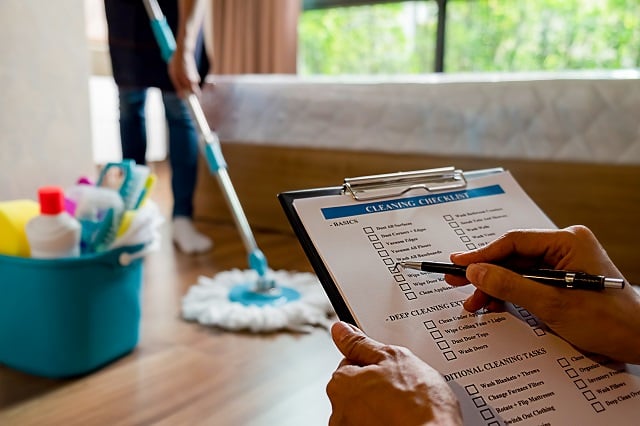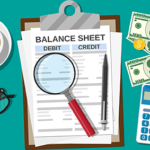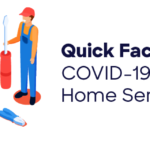
You should typically charge between $100 to $200 for house cleaning, or between $25 and $90 per hour, per cleaner. You can also charge specifically based on the area of the house you’re tasked with cleaning, which should generally range between $0.05 and $0.10 per square foot. Ultimately, you should charge based on factors like:
- The size of the home.
- The local cost of living.
- The level of work required.
- Demand in your area.
- If you’ll regularly clean, or if it’s a one-off.
- How much experience you have.
- What your competitors charge.
On This Page:
- How Much to Charge for Deep Cleaning a House
- Starting a Cleaning Business: How Much to Charge
- How to Price Cleaning Services
- How to Calculate Cleaning Cost Per Square Foot
- How Much Should I Charge for a Move Out Cleaning?
How Much to Charge for Deep Cleaning a House
You should charge between $200 and $400 to deep clean a house. If it’s a big, one-time deep clean, you can charge up to $0.20 per square foot.
If you charge per hour, a deep cleaning takes anywhere from 5 to 12 hours, so you should charge between $150 and $1,000 or more. It’s a wide range because there are a lot of factors like how many people are in your cleaning crew, the home’s state of tidiness and its size.
Deep cleaning a house costs more because it’s obviously more intensive than your regular cleaning services. It usually means you’ll have to spend more time and resources in a residence. People who appreciate these services typically have their homes deep cleaned once or twice a year. Other clients may need your help with a move out or hoarding situation.
Ultimately, the same factors as regular cleaning – like the level of work required, the size of the house and what your competitors charge – should all come together to help you price your services.
Starting a Cleaning Business: How Much to Charge
House cleaning prices and rates typically range between $25 and $50 an hour. This is for a typical job that doesn’t include deep disinfecting or specialized work. Just getting started? Here’s a good place to start on a pricing model:
1. Establish what your competitors are charging.
Call local housecleaning and maid services to find out what they charge customers for their services. You can do this by asking directly what they charge per hour, or asking them to estimate the cost of cleaning your own home. Once you know the rates of several competitors, add the numbers together and divide by the total number of rates to get an average.
If there are three competitors who share rates (x), add each of them together and divide by three (y) to find the average.
X + X + X / Y
Now you’ll have a good idea of average cleaning costs in your area, which can help anchor you to competitive prices.
2. Figure out what kind of cleaning you’ll do.
Base the services you plan to offer on what you’re capable of. This will look different for everyone: Weekly cleaning? Bi-weekly cleaning? Monthly, or deep-cleaning? Move out or hoarding cleaning?
Combine what you know about your competitors and customer demand with the average pricing for the work you do. Remember that some types of cleaning are considered extra, and you may need to repeat step one to figure out individual rates for add-ons like the following:
- Garage: Find your local average.
- Backyard: Find neighborhood average.
- Baseboards: Find the average for your area.
- Fridge interior: $25 to $35.
- Oven interior: $25 to $35.
- Blinds: $3 to $5 per set.
- Inside cabinets: $15 to $35 per set.
3. Calculate how much time a job takes you.
The last factor in figuring out how much to charge is time. How long does it take you to clean each area of a home? You can calculate this by timing yourself as you clean your own house, or a friend or family member’s home. Time yourself as you move from each area to the next:
- Bathroom.
- Hallway.
- Bedroom.
- Kitchen.
- Foyer.
- Loft or other “bonus” room.
- Stairs.
- Living areas, including a family room, den, study, sunroom and more.
You need to average out how long it takes you to clean each room, so that when a client comes to you and asks you to work for them, you can give them an accurate and reliable estimate of cost and time. Add up the time it takes to clean each area (X) and divide by the number of areas (Y) to find the average time you’ll spend in a home. If your home has five different areas, add up the individual times (X), then divide by five (Y). The equation looks like this:
X+X+X+X+X / Y
Now, you’ve got the information you need to start a cleaning business.
- You know what your competitors charge.
- You’ve priced out add-ons.
- You can estimate how long it’ll take you to clean a home based on how many rooms it has.
Make sure to also calculate your expenses to ensure at least 20% in profits after paying overhead fees, including your salary. This helps set your business up for long-term success.
Ready to get to work? Sign up for Angi Leads (formerly HomeAdvisor Pro) to get cleaning job leads. You can also find competing local cleaning services near you to compare services.
How to Price Cleaning Services
How to charge for house cleaning depends on what your competitors cost, the type of cleaning you plan to do and how much time it takes you to do different jobs.
How to Price Residential Cleanings
Nationally, people charge between $25 and $50 an hour for regular cleaning services that don’t include add-ons, deep cleans or other intensive work. Using an average of these numbers, here are estimates for what to charge based on square footage and an hourly rate of $40.
| Size Per Thousand Square Ft. | Hours Spent Cleaning | What to Charge Per Cleaner |
|---|---|---|
| 1,000-2,000 | 1.5-3 | $60-$120 |
| 2,000-3,000 | 3-4.5 | $120-$180 |
| 3,000-4,000 | 4.5-6 | $180-$240 |
| 4,000-5,000 | 6-7.5 | $240-$300 |
How to Price Residential Deep Cleanings
Deep cleaning is more intensive and means you should charge more for the job. People typically charge $60 per hour and more, per cleaner, for deep cleans. The time and money depend on the amount of dirt and grime in the home. Here’s an estimate of how much time it takes, and how much you should charge, for this type of work.
| Size Per Thousand Square Ft. | Hours Spent Cleaning | What to Charge Per Cleaner |
|---|---|---|
| 1,000-2,000 | 2-4.5 | $175-$400 |
| 2,000-3,000 | 4.5-5.5 | $400-$500 |
| 3,000-4,000 | 5.5-6.5 | $500-$600 |
| 4,000-5,000 | 6.5-8+ | $600-$650+ |
How to Calculate Cleaning Cost Per Square Foot
To calculate cleaning cost per square foot, you’ll need to do the following:
- Calculate how much time it takes to clean 500 square feet.
- Figure out the average square footage of the homes you’re cleaning.
- Divide your price per hour (X) by the square footage (Y). The equation looks like this:
X / Y = Price per square foot
| Square footage | Hour(s) | Price Per Hour |
|---|---|---|
| 1,000 | 1 | $30 |
| 1,500 | 1.5 | $45 |
| 2,000 | 2 | $60 |
In this example, the price per square foot will remain at $0.03, unless you need to raise to accommodate for other factors like build-up from dirt and grime.
How Much to Charge for House Cleaning Per Hour
Use the same method here as you do to price your cleaning services. Consider the average national price, which is about $25 to $50 per hour, as well as what your competitors charge, the state of a residence and the type and frequency of cleaning you’re doing. Professionals usually charge less if they’re going to work for the client repeatedly.
How Much Should I Charge for a Move Out Cleaning?
People typically charge up to $0.20 per square foot for a move out cleaning, or about $400 for a 2,000 square foot home. You should charge based on basic cleaning – like dusting, mopping, scrubbing and vacuuming – as well as any additional services they ask for, like carpet or furniture cleaning, window or screen cleaning, and any polishing or waxing. Here’s an idea of what that looks like in practice.
| Type of Service | What to Charge |
|---|---|
| Carpet cleaning | $125-$250 |
| Furniture or upholstery cleaning | $125-$230 |
| Window cleaning, per pane | $2-$7 |
| Polish or wax floors | $100-$300 |
Stay Up to Date on Trends
Get the latest marketing & business tips in your inbox.










